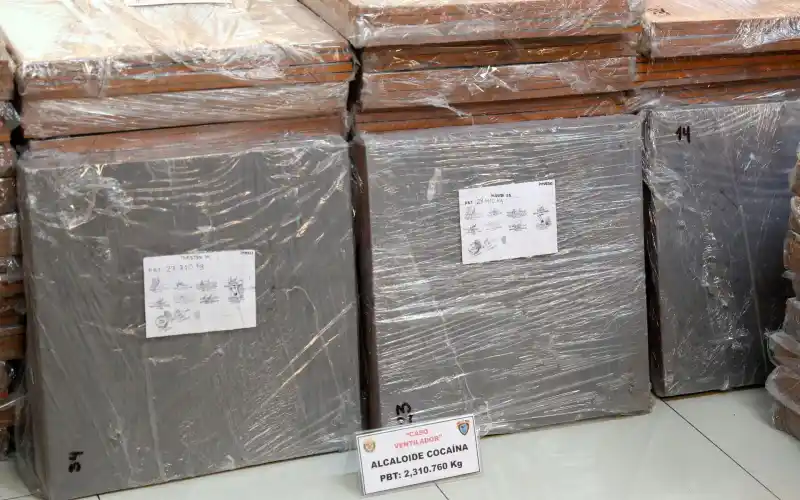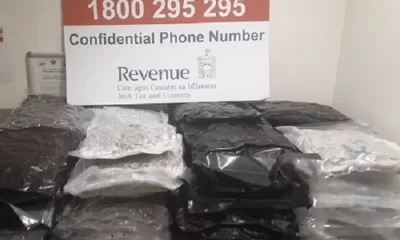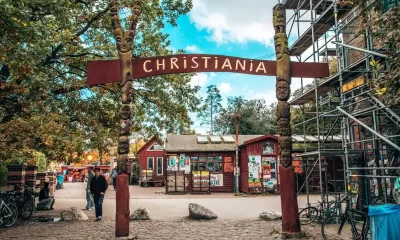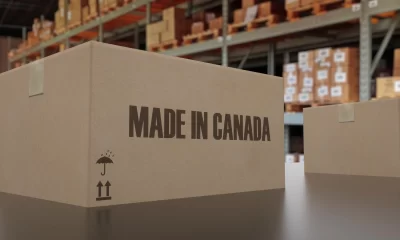Business
Police in Peru Seize $20M of Coke Headed for Turkey

Law enforcement in Peru displayed the seized drugs at a press conference Monday.
Law enforcement authorities in Peru said this week that they seized more than two tons of cocaine that was bound for Turkey.
Reuters reports that the “drug bust happened Friday at a warehouse at Peru’s biggest port, El Callao, just outside the capital Lima.”
“This is the first incident that we know of (in which the cargo was in) Peruvian ports and its final destination was Turkey. Usually we are aware of ports in Belgium, the Netherlands, Spain and France,” said El Callao’s police chief, Colonel Luis Angel Bolanos, as quoted by Reuters.
According to Reuters, police “displayed the cocaine, which had been fixed to rubber sheets to appear as hundreds of ceramic tiles packed in wooden boxes inside a shipping container” during a press conference on Monday.
The news service reported that “Bolanos said the seized cocaine was valued at ‘at least $20 million.’”
“The Andean nation seized a record 86.4 tonnes of drugs and illicit substances last year, 28 tonnes of which were cocaine hydrochloride, police data shows,” according to Reuters. “Peru and nearby Colombia are among the top global producers of cocaine and of the coca leaf it is made of, according to the United Nations. Production in Peru has been mostly growing along the border with Brazil in the Ucayali region, where coca leaf crops have almost sextupled in size in two years to 10,229 hectares (25,276 acres) in 2021, according to Peruvian authorities.”
Last year, the White House released a report on cocaine production in South America, including Peru.
“The United States recognizes the Government of Peru’s commitment to reduce coca cultivation and cocaine production. Estimated coca cultivation and cocaine production in Peru decreased but remained high at 84,400 hectares and 785 metric tons, respectively. The current level of coca cultivation highlights the importance of returning to pre-pandemic levels of eradication, while investing in a holistic approach that seeks to bring safety, security, and opportunity to rural Peruvians,” the White House said.
“The Biden-Harris Administration is committed to continuing close cooperation with our partners in South America to address our shared challenge of drug production, trafficking and use,” said Dr. Rahul Gupta, the director of the White House Office of National Drug Control Policy. “As part of President Biden’s National Drug Control Strategy, we are pursuing policies that expand access to the continuum of care for substance use, go after drug traffickers and their profits, and also address the root causes of participation in the illicit economy in coca-growing areas, such as poverty, insecurity, and the lack of access to services.”
Turkey, meanwhile, “has become a global trafficking hub for South American cocaine, fuelling rising demand for the drug in Eastern Europe and the Persian Gulf, according to organised crime experts,” Vice reported last year.
“A two-part analysis by InSight Crime, an investigative organisation, published today and last week reveals that gangs in Turkey, a country notorious for its major role in heroin trafficking between Afghanistan to Europe, now have major interests in the cocaine trade,” according to Vice, which said that Turkey’s increased involvement in the trade came “when South American cocaine producers needed a new route eastwards for their product, as so much of it was being seized going into western Europe.”
“Turkish gangs were attracted to the cocaine business due to their maritime expertise, diminishing profits from heroin due falling wholesale prices, a growing demand for cocaine in badly supplied parts of eastern Europe and the Middle East, and closer links between Turkish criminals – including the far-right Grey Wolves – and cartels in Latin America,” Vice reported. “As a result, Turkish traffickers have become key players supplying South American cocaine to emerging markets in Russia, the Balkans and a new desert cocaine route through northern Iraq into the Persian Gulf, according to the research.”
Source: https://hightimes.com/news/police-in-peru-seize-20m-of-coke-headed-for-turkey/
Business
New Mexico cannabis operator fined, loses license for alleged BioTrack fraud

New Mexico regulators fined a cannabis operator nearly $300,000 and revoked its license after the company allegedly created fake reports in the state’s traceability software.
The New Mexico Cannabis Control Division (CCD) accused marijuana manufacturer and retailer Golden Roots of 11 violations, according to Albuquerque Business First.
Golden Roots operates the The Cannabis Revolution Dispensary.
The majority of the violations are related to the Albuquerque company’s improper use of BioTrack, which has been New Mexico’s track-and-trace vendor since 2015.
The CCD alleges Golden Roots reported marijuana production only two months after it had received its vertically integrated license, according to Albuquerque Business First.
Because cannabis takes longer than two months to be cultivated, the CCD was suspicious of the report.
After inspecting the company’s premises, the CCD alleged Golden Roots reported cultivation, transportation and sales in BioTrack but wasn’t able to provide officers who inspected the site evidence that the operator was cultivating cannabis.
In April, the CCD revoked Golden Roots’ license and issued a $10,000 fine, according to the news outlet.
The company requested a hearing, which the regulator scheduled for Sept. 1.
At the hearing, the CCD testified that the company’s dried-cannabis weights in BioTrack were suspicious because they didn’t seem to accurately reflect how much weight marijuana loses as it dries.
Company employees also poorly accounted for why they were making adjustments in the system of up to 24 pounds of cannabis, making comments such as “bad” or “mistake” in the software, Albuquerque Business First reported.
Golden Roots was fined $298,972.05 – the amount regulators allege the company made selling products that weren’t properly accounted for in BioTrack.
The CCD has been cracking down on cannabis operators accused of selling products procured from out-of-state or not grown legally:
- Regulators alleged in August that Albuquerque dispensary Sawmill Sweet Leaf sold out-of-state products and didn’t have a license for extraction.
- Paradise Exotics Distro lost its license in July after regulators alleged the company sold products made in California.
Golden Roots was the first alleged rulebreaker in New Mexico to be asked to pay a large fine.
Source: https://mjbizdaily.com/new-mexico-cannabis-operator-fined-loses-license-for-alleged-biotrack-fraud/
Business
Marijuana companies suing US attorney general in federal prohibition challenge

Four marijuana companies, including a multistate operator, have filed a lawsuit against U.S. Attorney General Merrick Garland in which they allege the federal MJ prohibition under the Controlled Substances Act is no longer constitutional.
According to the complaint, filed Thursday in U.S. District Court in Massachusetts, retailer Canna Provisions, Treevit delivery service CEO Gyasi Sellers, cultivator Wiseacre Farm and MSO Verano Holdings Corp. are all harmed by “the federal government’s unconstitutional ban on cultivating, manufacturing, distributing, or possessing intrastate marijuana.”
Verano is headquartered in Chicago but has operations in Massachusetts; the other three operators are based in Massachusetts.
The lawsuit seeks a ruling that the “Controlled Substances Act is unconstitutional as applied to the intrastate cultivation, manufacture, possession, and distribution of marijuana pursuant to state law.”
The companies want the case to go before the U.S. Supreme Court.
They hired prominent law firm Boies Schiller Flexner to represent them.
The New York-based firm’s principal is David Boies, whose former clients include Microsoft, former presidential candidate Al Gore and Elizabeth Holmes’ disgraced startup Theranos.
Similar challenges to the federal Controlled Substances Act (CSA) have failed.
One such challenge led to a landmark Supreme Court decision in 2005.
In Gonzalez vs. Raich, the highest court in the United States ruled in a 6-3 decision that the commerce clause of the U.S. Constitution gave Congress the power to outlaw marijuana federally, even though state laws allow the cultivation and sale of cannabis.
In the 18 years since that ruling, 23 states and the District of Columbia have legalized adult-use marijuana and the federal government has allowed a multibillion-dollar cannabis industry to thrive.
Since both Congress and the U.S. Department of Justice, currently headed by Garland, have declined to intervene in state-licensed marijuana markets, the key facts that led to the Supreme Court’s 2005 ruling “no longer apply,” Boies said in a statement Thursday.
“The Supreme Court has since made clear that the federal government lacks the authority to regulate purely intrastate commerce,” Boies said.
“Moreover, the facts on which those precedents are based are no longer true.”
Verano President Darren Weiss said in a statement the company is “prepared to bring this case all the way to the Supreme Court in order to align federal law with how Congress has acted for years.”
While the Biden administration’s push to reschedule marijuana would help solve marijuana operators’ federal tax woes, neither rescheduling nor modest Congressional reforms such as the SAFER Banking Act “solve the fundamental issue,” Weiss added.
“The application of the CSA to lawful state-run cannabis business is an unconstitutional overreach on state sovereignty that has led to decades of harm, failed businesses, lost jobs, and unsafe working conditions.”
Business
Alabama to make another attempt Dec. 1 to award medical cannabis licenses

Alabama regulators are targeting Dec. 1 to award the first batch of medical cannabis business licenses after the agency’s first two attempts were scrapped because of scoring errors and litigation.
The first licenses will be awarded to individual cultivators, delivery providers, processors, dispensaries and state testing labs, according to the Alabama Medical Cannabis Commission (AMCC).
Then, on Dec. 12, the AMCC will award licenses for vertically integrated operations, a designation set primarily for multistate operators.
Licenses are expected to be handed out 28 days after they have been awarded, so MMJ production could begin in early January, according to the Alabama Daily News.
That means MMJ products could be available for patients around early March, an AMCC spokesperson told the media outlet.
Regulators initially awarded 21 business licenses in June, only to void them after applicants alleged inconsistencies with how the applications were scored.
Then, in August, the state awarded 24 different licenses – 19 went to June recipients – only to reverse themselves again and scratch those licenses after spurned applicants filed lawsuits.
A state judge dismissed a lawsuit filed by Chicago-based MSO Verano Holdings Corp., but another lawsuit is pending.
Source: https://mjbizdaily.com/alabama-plans-to-award-medical-cannabis-licenses-dec-1/
-

 Business2 years ago
Business2 years agoPot Odor Does Not Justify Probable Cause for Vehicle Searches, Minnesota Court Affirms
-

 Business2 years ago
Business2 years agoNew Mexico cannabis operator fined, loses license for alleged BioTrack fraud
-

 Business2 years ago
Business2 years agoAlabama to make another attempt Dec. 1 to award medical cannabis licenses
-

 Business2 years ago
Business2 years agoWashington State Pays Out $9.4 Million in Refunds Relating to Drug Convictions
-

 Business2 years ago
Business2 years agoMarijuana companies suing US attorney general in federal prohibition challenge
-

 Business2 years ago
Business2 years agoLegal Marijuana Handed A Nothing Burger From NY State
-

 Business2 years ago
Business2 years agoCan Cannabis Help Seasonal Depression
-

 Blogs2 years ago
Blogs2 years agoCannabis Art Is Flourishing On Etsy













